London Elections 2022. Influence your candidates NOW!
London Elections 2022.
Influence your candidates to take action on child poverty.
On 5 May 2022 in all 32 London boroughs apart from The City of London, every council seat is up for election.
This presents a once-in-four-year opportunity to grab the attention of those who would represent us, tell them about the impact of poverty on the city’s children and what they must do to tackle it. With child poverty rates in London among the highest in the country and many families are now facing severe hardship in the face of the cost-of-living crisis, it is a matter of urgency that those seeking election to their local council prioritise tackling child poverty in their communities.
4in10, alongside other organisations in the London Child Poverty Alliance, is asking its members to engage with candidates in these elections to encourage them to sign our pledge to work towards a child poverty free London.
We hope that as a result, on 5 May there will be hundreds of local government elected officials who are better informed about how they can tackle child poverty in the local communities and are ready to take action to do so.
Manifesto for a child poverty free London
The London Child Poverty Alliance’s Manifesto for a Child Poverty Free London sets out twelve key ‘asks’ that it believes if put into action, would make a significant contribution towards creating a child poverty free London. The asks are focused on four key areas:
- Action on income
- Action on housing
- Action on childcare
- Action on hunger
The manifesto website provides prospective councillors with good practice examples, local data and further information about how these can be put into practice in their communities. It also contains a signup page where they can publicly commit to work towards a child poverty free London.
Take part in the campaign
First and foremost, we are asking you to share the manifesto with your staff, volunteers and those you work with and ask them to ask candidates they meet to sign up to the pledge via the manifesto website.
If you have the capacity, you could also send manifesto to the candidates in your ward, or across the area where you are based, asking them to sign the pledge.
The easiest way to find out who your local candidates are is to visit the Who Can I Vote For? website and enter your postcode. Alternatively, you could contact the local offices of the main political parties to ask them for their contact details.
Also look out for local hustings events going on in your community and if possible attend one. These will provide an opportunity for you to ask the candidates what they plan to do to tackle child poverty, you can use the manifesto to help you decide what to ask.
If you need any support or have any questions, please contact us and we’ll be very happy to assist.
Register to vote
And finally, don’t forget to register to vote! It is possible to register to vote even without a permanent address. The deadline to apply is 14th April and the deadline for applying for a postal vote is 19th April. Contact your council’s electoral services team for more information.
Useful resources
London Councils Guide to How elections work
Guidance from the Charity Commission on campaigning during election periods
Interesting Blog from New Philanthropy Capital
What Will Spring Statement the Spring Statement Mean for Charities.
Thank you to NPC for allowing us to share this. For more information click here:
Spring is upon us. Flowers are blooming, birds are finally singing—and the sound of tweeting will reach deafening levels this week as the change of seasons also brings a new Spring Statement from the Chancellor. But as new beginnings go, the outlook has looked brighter.
A lot has happened since the somewhat optimistic-feeling autumn budget, and not much of it has been good for the charity sector: a war in Europe, the subsequent economic and social fallout, and spiralling living costs across the country. With this backdrop, ‘levelling up’ has dropped down the agenda, but it cannot be forgotten. More than ever, we need to see the budget deliver for marginalised groups who are most vulnerable to these social and economic shocks.
What will be the big themes of the budget?
In the short term, the overall economic outlook is pretty bleak. Inflation is rising to 30-year highs and may hit double digits, with another spike likely in the autumn. Disposable income is set to see the largest annual fall in 50 years. The government already announced a rise in the National Insurance rate—and although they may be scrapping this for the lowest paid workers, it will provide little salvation to those most affected by rising costs. The Chancellor has teased that rising food and fuel prices are likely to be confronted with a package of support, in addition to the £350 package announced in February—which now seems like a drop in the ocean. However, rumoured defence spending rises and support for Ukraine may limit the Treasury’s ability to ease people’s concerns.
We also have huge labour market vacancies, with around 1.2 million fewer people in the labour market compared to pre-pandemic trends. This is driven both by the young, but also by over 50s who have left the labour market completely. The Treasury will likely be thinking closely about this and an update to the plan for jobs is expected on Wednesday.
What should charities be expecting?
There may be tough times ahead for the charity sector. The combination of rising costs, rising demand and inflation, leading to a decline in value of grants and donations, could be a serious one for charities. What is certain is that as an abstract ‘cost of living crisis’ moves into a desperate ‘can’t heat my home’ crisis, charities will be ever more in need.
Along with the support for household bills already mentioned, there have been some rumoured benefit changes which the Chancellor may employ to try and soften the blow. For example, lowering the taper rate of Universal Credit again, or raising child benefit or pensions, but in the short term this is unlikely to seriously alter the circumstances of many people that charities support.
Charities whose work concerns Ukraine should also expect specific announcements around the crisis—both in terms of more support for resettling people in communities here, and also in terms of increased aid for organisations working closer to Kyiv.
What about levelling up?
With everything else that’s in the news, the mission to ‘level up’ the country has fallen down the agenda. However, the pain people will be feeling over the coming months means that this support is needed more than ever.
The largest levelling up fund yet to be allocated is the UK Shared Prosperity Fund (UKSPF). This is meant to replace EU funding for business support, community infrastructure, and employment and social exclusion support. The prospectus for the UKSPF is due soon, and allocations to lead authorities may be made as early as the Spring Statement. Given the labour market vacancies, this would be welcome.
What may be missing, however, is support for tackling social needs. In the pre-launch guidance for the UKSPF, the government quietly revealed that new funding for people and skills may not be available until 2024 / 25. As we outlined in our recent briefing, this could leave a three-year gap in new funding which will affect the most marginalised in the country the most, and will risk progress on the levelling up agenda.
At NPC, we’re worried this is going to blunt charities’ ability to deliver for communities around the country at a time when they are needed most. Following on from our briefing, we will be running an event on the UK Shared Prosperity Fund next month, focused on how charities and local government need to work together to ensure people don’t lose out on support. This will be vital viewing for anyone trying to tackle social exclusion or improve employment in communities around the country. Further details announced soon.
Longer-term, we are focused on ensuring that the lessons from projects working on social issues around the country are kept at the heart of future levelling up plans. Later this year, the government will be launching its Strategy for Community Spaces and Relationships. We know how much there is to learn from work that’s already happened, and we will be pulling together best practice from community initiatives across the country, along with fresh thinking, to design plans that can genuinely tackle the social needs that people see as key to the success of levelling up.
The Spring Statement is unlikely to bring a new start for the charity sector, but we know many charities have already planted seeds which address the issues communities care about. We want to help them grow and thrive elsewhere.
Get in touch with Theo.Clay@thinkNPC.org if you want to learn more.
Read 4in10's Latest Newsletter Here
News, Campaigns, Data, Funding and More.
To receive our newsletter every fortnight directly to your inbox, join us here.
Spotlight on 4in10 Member Praxis and the NRPF Action Group
How are you helping to tackle child poverty in London?
Praxis is a charity for migrants and refugees. We provide immigration advice, housing and peer support and through all of these ways our work helps to protect children from poverty. We have become a leading expert in finding pathways out of destitution and supporting migrants facing homelessness, and our training and campaign work has national and international impact. Our core purpose is to help migrants in crisis or at risk, ensuring they can live in safety, overcome the barriers they face, and take control of their own destinies. You can read more about our strategy here, find us on Facebook, Twitter and our website here.
As part of this work, we facilitate the No Recourse to Public Funds Action Group, which is made up of campaigners with lived experience of the No Recourse to Public Funds (NRPF) policy, to build campaigns to end this policy. You can find out more about our campaign, and read the NRPF Action Group’s manifesto calling for the end of NRPF here.
Tell us something you are excited about?
We are really excited that the group has decided to focus on campaigning for free school meals. The overarching goal of our campaign is to ensure free school meals for all children living in poverty, regardless of their parents’ immigration status. We’re launching with a specific call to the Government to make permanent the temporary extension of free school meals to some groups of children living in poverty affected by No Recourse to Public Funds, which was brought in during the pandemic.
We are also calling for free school meals for all children in poverty, regardless of immigration status, to take into account the fact that children with insecure immigration status are not covered by the extension of eligibility.
Our policy briefing sets out our campaign asks in more detail – you can find that here;
Additionally, here are some posts you can share if possible:
- Facebook: https://www.facebook.com/PraxisCommunityProjects/posts/325409016299148
- Twitter: https://twitter.com/Praxis_Projects/status/1500765019050500096
- Instagram: https://www.instagram.com/p/CazDWYtoCQa/
- LinkedIn: https://www.linkedin.com/feed/update/urn:li:activity:6906533946969186304
If you can support our campaign on social media, in your email networks and newsletters, this would be hugely appreciated! Please do reach out if you would like to collaborate in any way!. Any support you can offer to our campaign is hugely welcomed and thank you for all you do – Pascale.robinson@praxis.org.uk
Share with our members something positive about your organisation’s achievement or service?
We were one of the organisations that helped to uncover the Windrush Scandal originally and we’re proud to have been part of the work to campaign to change the system.
What can other network members learn from you or find out more about through you?
- We can offer advice for those who need help navigating the migration system: Get Help — Praxis for Migrants and Refugees.
- We are experts in finding pathways out of destitution and supporting migrants facing homelessness. Please reach out to collaborate on this!
- We can offer training on the immigration system for a variety of organisations (depending on our capacity).
What would most help you achieve your goals?
We want to make sure that migrants can live in safety, overcome the barriers they face, and take control of their own destinies. To do this, we campaign for systemic change. We’re building alliances and working in partnership with experts by experience to create positive, long-term changes to the policies and practices that create exclusion and destitution. We’d love to collaborate on work to achieve these goals!
Why did you join 4in10? What do you enjoy about being part of the 4in10 network?
Though we have only been in contact with the 4in10 team for a short while, 4in10 has already provided a brilliant chance to forge connections and collaborate with other amazing organisations working in the capital!
We are so looking forward to working together more, especially on our campaign to make sure all who need them have access to free school meals regardless of their immigration status.
Fantastic 4in10 Coffee Morning on Child Care
4in10 Coffee Mornings are always full of great people and good things. Just to wet your appetite for future ones and to give you some insight into why we chose child care as the issue for today you can find the slides below.
Thanks to Steve Triner from Sutton CAB and Samantha Creme from the London Early Years Foundation.
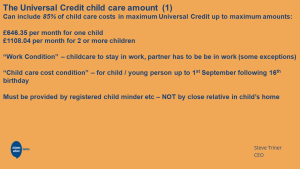
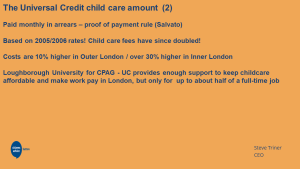
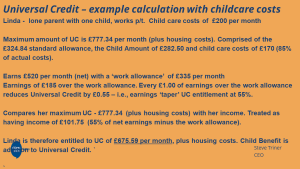
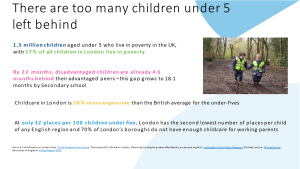

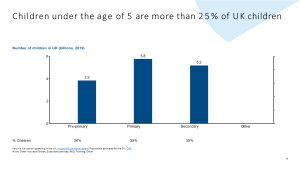
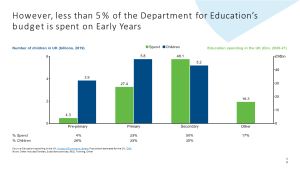
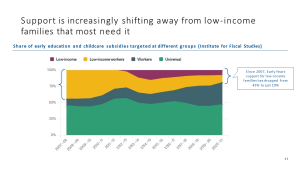
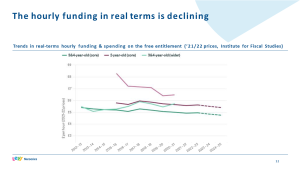
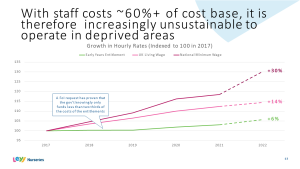
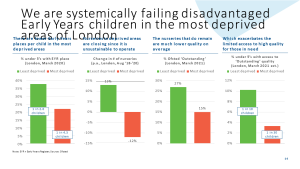
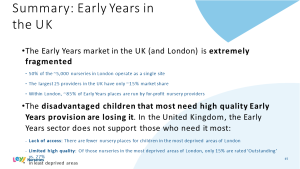
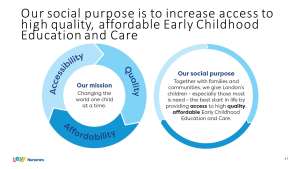
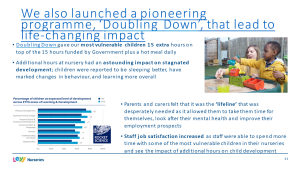
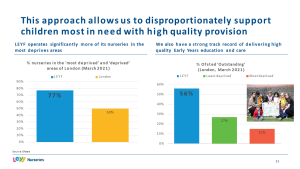
4in10 Newsletter
The latest news, data, jobs, funding and more from 4in10, members and friends.
To get the latest issue directly to your inbox every other Thursday sign up here.
Launch of Sustain’s Good Food for All Londoners Report
Measure Your Borough’s Responses to Food Insecurity.
This is a resource where you can see how every individual borough in London is doing against a range of measures to tackle food insecurity.
Councils in London have been measured against two key themes: tackling food poverty, and how they’re bringing healthy and sustainable food to people living in their borough, in this year’s Good Food for All Londoners report published by London Food Link. London Food Link, a network that strives for a food system that benefits all Londoners and led by Sustain, the food and farming alliance, has delved into council action across the city on fundamental food issues such as household food insecurity, healthy food environments, the wider food economy, and for the first time, climate action and food. Find out what’s happening in your borough and how your council performed on the good food leader board.
Cost of Living Crisis. URGENT action needed.
With the spring budget fast approaching 4in10 are calling on the Chancellor to uprate benefits in line with the Bank of England's February 2022 Monetary Policy Report forecast of 7% inflation.
We know this is not a solution to all poverty by any means and that there needs to be major changes to economic systems and social security in the longer term but it is what we can do to support many of our families now.
We have written to all our members and asked them to take action with tips for engaging local MP's and a sample email for adapting locally.
Please do feel free to use these to contact London MP's in time for them to understand how the cost of living crisis is impacting on their constituents from your experience.
A copy of the letter, tips for engagement and sample email are available here.



